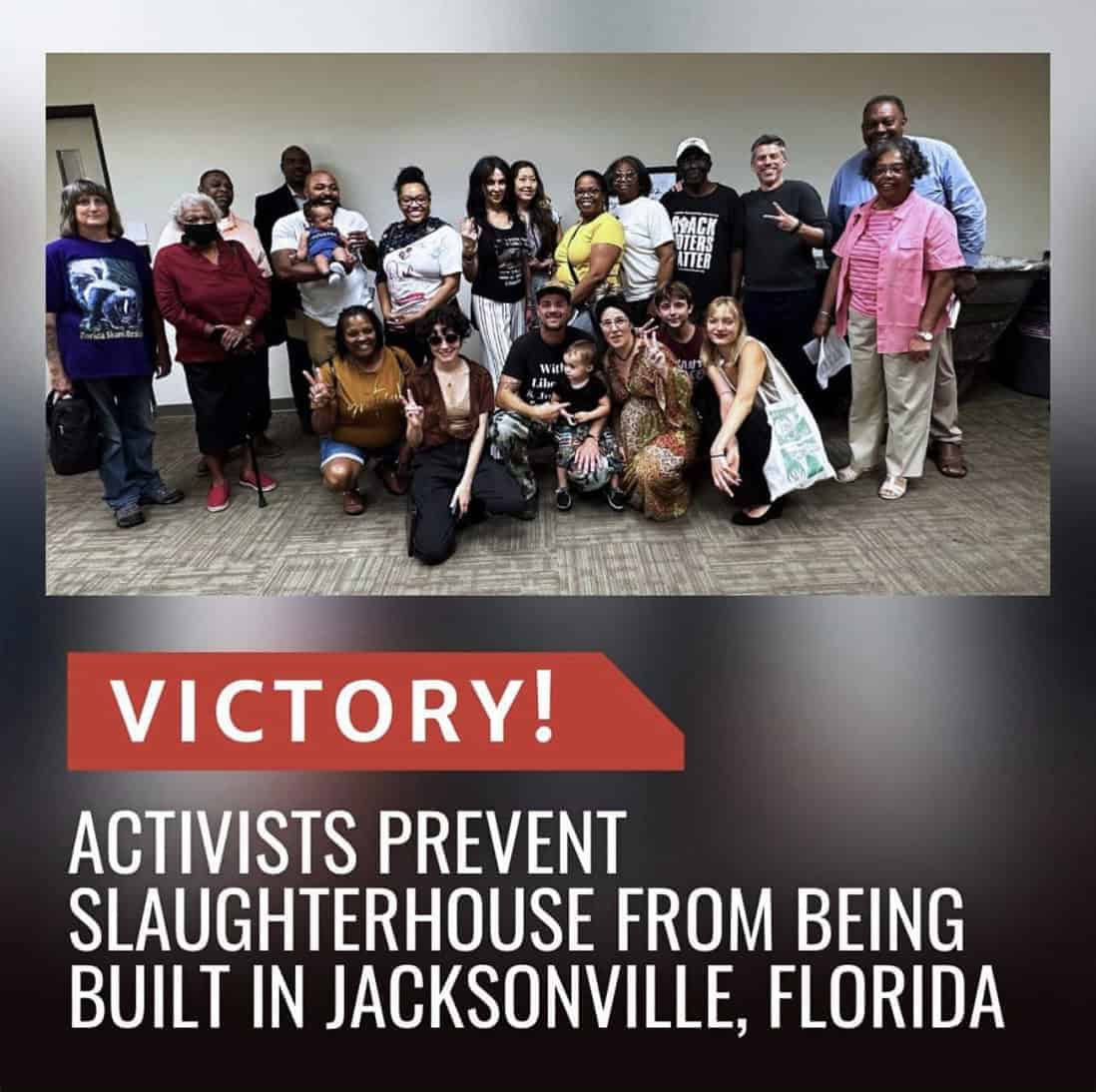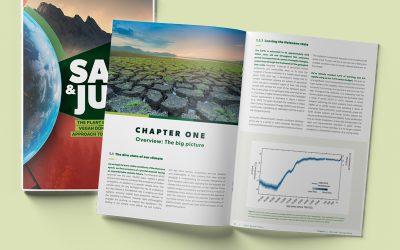Blog
Major Victory: Slaughterhouse Plans Withdrawn In Florida After Public Protest
July 9, 2024
A new slaughterhouse that was slated to open in Jacksonville Florida will not be moving forward. This is a major win for animals and local residents, as the 25,000-square-foot processing facility would have greatly impacted the quality of life of people living in the area, resulted in the killing of hundreds of thousands of animals, and added to the destruction of our Earth.
In Defense of Animals, Plant Based Treaty, and Solutionary Species joined forces to speak out against the slaughterhouse plans, raise awareness, and create positive change. They were joined by activists and citizens at a public hearing on April 18 when it was announced the application for electric, sewer and water service, and a zoning exception for the property would not move forward. Furthermore, Mohammad Faisal, owner of Apna Bazar’s proposed halal slaughterhouse, publicly apologized to the community.

In Defence of Animals reported Faisal as saying;
“We are not here to hurt them [local citizens] or make them complain for anything they think we should not be doing. So that’s why we’re withdrawing our application and I’m sorry, again I want to apologize for that.”
The proposed slaughterhouse in this residential neighborhood would have resulted in environmental injustice, racism and discrimination against minorities living in low-income neighborhoods. Slaughterhouses produce massive amounts of waste and huge open-air cesspools are packed with feces and urine forming lagoons that contaminate local water sources, harm aquatic ecosystems, and cause health complications for people living nearby.
The National Library of Medicine reports on a study from the Environmental Protection Agency stating slaughterhouse facilities “discharges the highest phosphorus levels and second highest nitrogen levels of all industrial categories.” Pollutants also enter drinking water supplies via runoff and groundwater seepage from agricultural fields where slaughter facilities frequently spray their waste, resulting in a host of issues, including asthma attacks, autoimmune disorders, bacterial infections, birth defects, cognitive impairment in children, cancer, gastrointestinal problems, miscarriages, and even death.”
The issue of environmental justice was covered in the documentary The Smell of Money which highlighted North Carolina and the state’s massive pig factories.
The issue of environmental justice was covered in the documentary The Smell of Money which highlighted North Carolina and the state’s massive pig factories. A study from 2014 states that “IHO’s [industrial hog operations] in NC disproportionately affects Black, Hispanic and American Indian residents.”
This issue was also raised in the Netflix Series, You Are What You Eat: A Twin Experiment, a documentary based on the groundbreaking study by Stanford Medicine.
The number of pigs in North Carolina far exceeds the number of people, and there are many concentrated animal feeding operations (CAFO’s) in the region, some with up to 60,000 animals each. Stopping this from happening in Florida is crucial and the shutdown of the slaughterhouse in Jacksonville will hopefully have a domino effect and shut down others.

“This victory goes to show that people have the power to make a difference by showing up and speaking out against these unnecessary facilities,” said Malaina Watts, U.S. Liaison and Campaigner for Plant Based Treaty. “We are living in a time when we should be phasing out animal agriculture and switching to plant-based food systems, to make crucial changes necessary for our health and the future of our planet and all those that we share it with.” – In Defence of Animals
Demand one of the Plant Based Treaty is to relinquish and not create new animal farms or slaughterhouses, in addition to not clearing forests or other ecosystems for animal grazing, or animal farming of any kind. The goal is to put food systems at the heart of combating the climate crisis and halt the widespread degradation of critical ecosystems caused by animal agriculture.

Plant Based Treaty and In Defense of Animals have worked together previously in issues related to the environment and animals. In 2022 they collaborated to welcome a unanimous vote by the Los Angeles City Council to support the Plant Based Treaty initiative; and in 2021 joined forces to urge the UN’s COP26 to adopt the Plant Based Treaty to avert a climate catastrophe.
Furthermore, this is not the first time a slaughterhouse in Florida has been shut down by activists. In 2023 Solutionary Species, Plant Based Treaty, and West Florida Climate Save announced the proposed Alachua County slaughterhouse would not be moving forward after months of debates and protests surrounding the negative impacts on animals, public health, and the environment.
Both slaughterhouse shutdowns are a sign that we should not stop standing up for climate justice, animal rights, and human health. These victories are a sign of a global shift towards healthy and sustainable plant-based food systems that do not involve eating animals. But until all slaughterhouses close, activists with Animal Save Movement chapters around the world will continue to bear witness to cows, pigs, chickens, fish, and other animals that are being slaughtered for their flesh. The animals need us to keep telling their stories and fight for their freedom.

Miriam Porter is an award-winning writer who writes about veganism, social justice issues, and eco-travel. Miriam currently lives in Toronto with her son Noah and many rescued furry friends. She is a passionate animal rights activist and speaks up for those whose voices cannot be heard.
More from the blog
6 Important Calls To Action From The Safe And Just Report – Part One
By Miriam Porter
Grow Your Own Kale And Spinach For Healthy Green Smoothies
By Miriam Porter
The Importance Of Exercise And Tips On Building Muscle
By Miriam Porter



